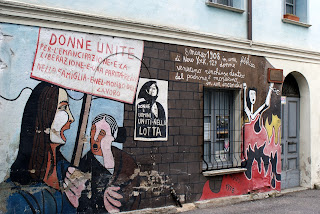
 We had a great time exploring this beautiful island by car on a couple of occasions. Initially we drove south to the heart of Sardinia’s bandit country in the limestone massif of the Supramonte mountains. We stopped in Oliena to pick up a walking map on our way up to Orgosolo, Sardinia’s most notorious town lying in the tough mountainous area known as the Barbagia. The
whole village has become an outdoor gallery of street art with around 200 social
and political murals adorning the buildings. The mural painting started in the 1970’s when teachers and students at the local high school decided to commemorate the liberation of Italy and the resistance movement. Many of the
murals are by the artist Francesco del Casino who was a teacher at the local
high school. The styles vary wildly, from naturalistic to Picasso like figures, depicting the big political events of the 20th and 21st centuries.
We had a great time exploring this beautiful island by car on a couple of occasions. Initially we drove south to the heart of Sardinia’s bandit country in the limestone massif of the Supramonte mountains. We stopped in Oliena to pick up a walking map on our way up to Orgosolo, Sardinia’s most notorious town lying in the tough mountainous area known as the Barbagia. The
whole village has become an outdoor gallery of street art with around 200 social
and political murals adorning the buildings. The mural painting started in the 1970’s when teachers and students at the local high school decided to commemorate the liberation of Italy and the resistance movement. Many of the
murals are by the artist Francesco del Casino who was a teacher at the local
high school. The styles vary wildly, from naturalistic to Picasso like figures, depicting the big political events of the 20th and 21st centuries.
Orgosolo murals
We took a scenic winding road down from the mountains to the tomba
di gigante of S’Ena ‘e Thomes. We
parked the car and enjoyed a 10 minute walk across fields laden with spring
flowers. The ancient mass grave was built in the Nuraghic period starting from
around 1800 BC. We returned to our hotel in Orosei via the pretty old stone
village of Galitelli and a quick peek at the nearby stunning swathe of pine
backed beach.
S'Ena 'e Thomes
The next day was going to be a long one. We rose early and
drove towards the Supramonte mountains to the Sa Barva bridge from where we were
going to walk the Gola su Gorropu gorge often known as the Grand Canyon of
Europe. It was a scenic two hour hike
along the Rio Flumineddu river to the mouth of the gorge. At the entrance we paid 5 euros and were
offered safety helmets. We ventured a further 1 km scrambling over huge rocks
and boulders before the use of specialist climbing equipment became necessary.
It was a spectacular sight with its steep walls topping 400 mts. We retraced
our weary steps and returned to the car some six hours later.
Asphodel and the Supramonte mountains
The following day we drove south through the mountain tops
and west across country avoiding the odd wild pig to Sardinia’s most
famous bronze age fortified settlement
and Unesco listed site the Nuraghe Su Nuraxi near Barumini. The Nuraxi tower
was the main focal point dating from around 1500 BC and subsequently four
further towers were added and village buildings between the 8th and
6th centuries BC. We then drove up to the La Giara di Gesturi, a
high basalt 45 sq km plateau in search of the wild mini horses the area is famous
for. Sadly we only spotted the odd wild pig. We continued west to the Costa
Verde and spent the night in Arbus.
The next morning we popped into the Museo del Coltello Sardo
a fascinating Sardinian knife museum. The museum was founded by Paolo Pusceddu whose
knives are among the most prized in Sardinia. We then made our way through a
valley lined with the abandoned buildings and machinery of a crumbling 19th
century mining settlement to the stunning Spaggia della Piscinas beach. We
continued north along the coast to the picturesque town of Bosa situated along
the palm tree lined banks of the river Temo with its pastel coloured houses
stacked on the hillside above. Our last stop was Alghero. We wandered past the
marina and explored the cobbled lanes of the beautiful old town once a Catalan
colony and admired the Spanish Gothic palazzi.
Our second tour took us north to the unspoilt and laid back
seaside town of Santa Teresa de Gallura with its beautiful Rena Bianca beach
and 16th century tower which overlooks the deep port. We went on a
day trip to Bonifacio and marvelled at the medieval houses precariously
teetering on the edge of the imposing limestone cliffs. Back down in the
natural harbour lined with chic bars and restaurants we had a coffee and
enjoyed people and yacht watching before it was time to board our ferry back. Back
in Olbia we took day trips out to visit some of the beautiful local beaches
including La Cinta which is a stunning swathe of white sand backing onto a
lagoon where we finally spotted some pink flamingos.
Rena Bianca Santa Teresa La Cinta







No comments:
Post a Comment